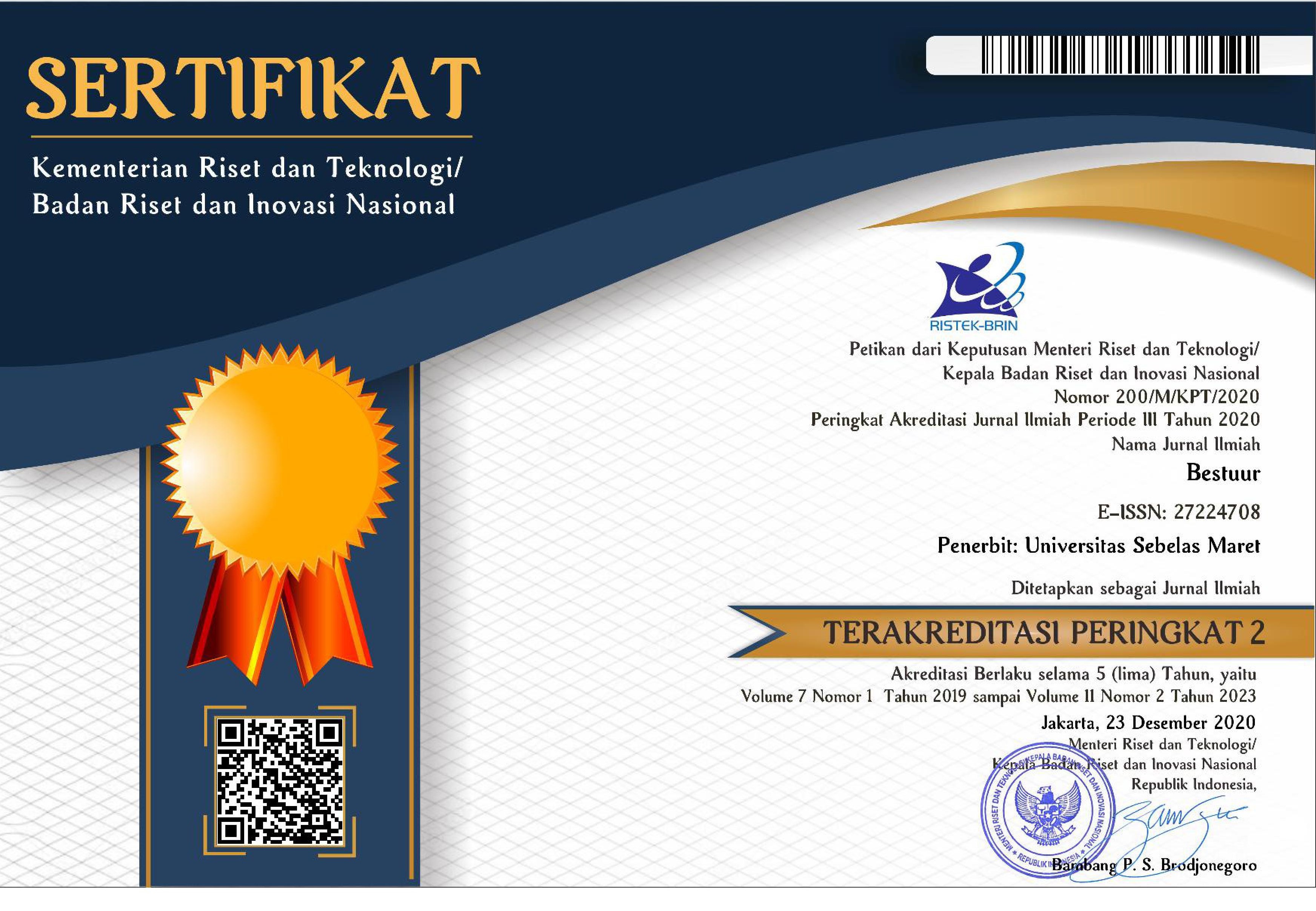Taxing Micro, Small and Medium Enterprises in Yogyakarta: Regulation and Compliance
Abstract
The Special Region of Yogyakarta is a region with prominent Micro, Small, and Medium Enterprises (MSMEs) actors in Indonesia. This invites the important question of whether the implementation of the new MSMEs tax regulations in the region impacts the intensification of final income tax and tax compliance. This study aims to analyze the relationship between the amendments of the final income tax policy and the legal compliance of MSMEs taxpayers. This research uses a juridical and empirical approach. Empirical data was collected by interview and questionnaire to seven taxpayers, while juridical data was obtained by analyzing the Government Policy on taxation. This study shows that the reduction of the final income tax tariff from 1% to 0.5% and the existence of legal certainty regarding the taxation time frame implies a positive impact on taxpayer compliance. This is demonstrated by the fact that the number of taxpayers in 2019 increased by 15% when compared to 2017. However, tariff reduction is not the solution to the non-compliant taxpayer. The Regional Office of the Directorate General of Taxes still found the tax avoidance. It means the government needs to conduct a more cooperative approach to improve MSMEs taxpayer compliance.
Keywords
Full Text:
PDFReferences
Castro, L., & Scartascini, C. (2015). Tax compliance and enforcement in the pampas evidence from a field experiment. Journal of Economic Behavior & Organization, 116, 65–82. https://doi.org/10.1016/j.jebo.2015.04.002
Deakin, S., Gindis, D., Hodgson, G. M., Huang, K., & Pistor, K. (2017). Legal institutionalism: Capitalism and the constitutive role of law. Journal of Comparative Economics, 45(1), 188–200. https://doi.org/10.1016/j.jce.2016.04.005
Dewi, F., & ER, M. (2019). Business Process Maturity Level of MSMEs in East Java, Indonesia. Procedia Computer Science, 161, 1098–1105. https://doi.org/10.1016/j.procs.2019.11.221
Duy, N. V., & Tran, T. Q. (2021). The influence of international standards on SME tax compliance in Vietnam. Finance Research Letters, 40, 101750. https://doi.org/10.1016/j.frl.2020.101750
Hajawiyah, A., Suryarini, T., Kiswanto, & Tarmudji, T. (2021). Analysis of a tax amnesty’s effectiveness in Indonesia. Journal of International Accounting, Auditing and Taxation, 44, 100415. https://doi.org/10.1016/j.intaccaudtax.2021.100415
Hanlon, M., & Heitzman, S. (2010). A review of tax research. Journal of Accounting and Economics, 50(2), 127–178. https://doi.org/10.1016/j.jacceco.2010.09.002
Huong, V. Van, & Cuong, L. K. (2019). Does government support promote SME tax payments? New evidence from Vietnam. Finance Research Letters, 31. https://doi.org/10.1016/j.frl.2018.11.017
Jimenez, P., & Iyer, G. S. (2016). Tax compliance in a social setting: The influence of social norms, trust in government, and perceived fairness on taxpayer compliance. Advances in Accounting, 34, 17–26. https://doi.org/10.1016/j.adiac.2016.07.001
Juniarti, J, Noersanti, L., & Susanti, E. H. (2019). The Impact of Modern Tax System Against Transport Workers Taxpayer Compliance Online. Proceedings of the 5th Annual International Conference on Accounting Research (AICAR 2018). https://doi.org/10.2991/aicar-18.2019.48
Kirchler, E., Maciejovsky, B., & Schneider, F. (2003). Everyday representations of tax avoidance, tax evasion, and tax flight: Do legal differences matter? Journal of Economic Psychology, 24(4), 535–553. https://doi.org/10.1016/S0167-4870(02)00164-2
Lagravinese, R., Liberati, P., & Sacchi, A. (2020). Tax buoyancy in OECD countries: New empirical evidence. Journal of Macroeconomics, 63, 103189. https://doi.org/10.1016/j.jmacro.2020.103189
Le, D. T., Malesky, E., & Pham, A. (2020). The impact of local corruption on business tax registration and compliance: Evidence from Vietnam. Journal of Economic Behavior & Organization, 177, 762–786. https://doi.org/10.1016/j.jebo.2020.07.002
Li, J., Wang, X., & Wu, Y. (2020). Can government improve tax compliance by adopting advanced information technology? Evidence from the Golden Tax Project III in China. Economic Modelling, 93, 384–397. https://doi.org/10.1016/j.econmod.2020.08.009
Luksic, J. (2020). The extensive macro labor supply elasticity: Integrating taxes and expenditures. European Economic Review, 121, 103325. https://doi.org/10.1016/j.euroecorev.2019.103325
Nugroho, M. A. (2015). Impact of Government Support and Competitor Pressure on the Readiness of SMEs in Indonesia in Adopting the Information Technology. Procedia Computer Science, 72, 102–111. https://doi.org/10.1016/j.procs.2015.12.110
Oliviero, T., & Scognamiglio, A. (2019). Property tax and property values: Evidence from the 2012 Italian tax reform. European Economic Review, 118, 227–251. https://doi.org/10.1016/j.euroecorev.2019.05.015
Otusanya, O. J. (2011). The role of multinational companies in tax evasion and tax avoidance: The case of Nigeria. Critical Perspectives on Accounting, 22(3), 316–332. https://doi.org/10.1016/j.cpa.2010.10.005
Purnawan, A., Khisni, A., & Witasari, A. (2019). Politics of Law of Imposing Income Tax (PPh) Based on Micro, Small and Medium Enterprises (MSMEs) with Justice Value Base to Increase Voluntary Tax Compliance in Industrial Revolution 4.0 Era. Proceedings of the 3rd International Conference on Globalization of Law and Local Wisdom (ICGLOW 2019). https://doi.org/10.2991/icglow-19.2019.73
Robbins, B., & Kiser, E. (2020). State coercion, moral attitudes, and tax compliance: Evidence from a national factorial survey experiment of income tax evasion. Social Science Research, 91, 102448. https://doi.org/10.1016/j.ssresearch.2020.102448
Saad, N. (2014). Tax Knowledge, Tax Complexity and Tax Compliance: Taxpayers’ View. Procedia - Social and Behavioral Sciences, 109, 1069–1075. https://doi.org/10.1016/j.sbspro.2013.12.590
Soewardi, T. J., & Ananda, C. F. (2015). The Transformation of Bea Acquisition Rights to Land and Buildings (BPHTB): Case Study in Kediri City of East Java. Procedia - Social and Behavioral Sciences, 211, 1179–1185. https://doi.org/10.1016/j.sbspro.2015.11.157
Szablowski, D., & Campbell, B. (2019). Struggles over extractive governance: Power, discourse, violence, and legality. The Extractive Industries and Society, 6(3), 635–641. https://doi.org/10.1016/j.exis.2019.06.009
Tondani, D. (2009). Universal Basic Income and Negative Income Tax: Two different ways of thinking redistribution. The Journal of Socio-Economics, 38(2), 246–255. https://doi.org/10.1016/j.socec.2008.10.006
Torgler, B., & Schneider, F. (2009). The impact of tax morale and institutional quality on the shadow economy. Journal of Economic Psychology, 30(2), 228–245. https://doi.org/10.1016/j.joep.2008.08.004
Yáñez-Araque, B., Sánchez-Infante Hernández, J. P., Gutiérrez-Broncano, S., & Jiménez-Estévez, P. (2021). Corporate social responsibility in micro-, small- and medium-sized enterprises: Multigroup analysis of family vs. nonfamily firms. Journal of Business Research, 124, 581–592. https://doi.org/10.1016/j.jbusres.2020.10.023
DOI: https://doi.org/10.20961/bestuur.v9i1.49184
Refbacks
- There are currently no refbacks.
Copyright (c) 2021 Siti Rahma Novikasari, Duc Quang Ly, Kerry Gershaneck
License URL: https://creativecommons.org/licenses/by/4.0/
|











_CROSREF.jpg)




